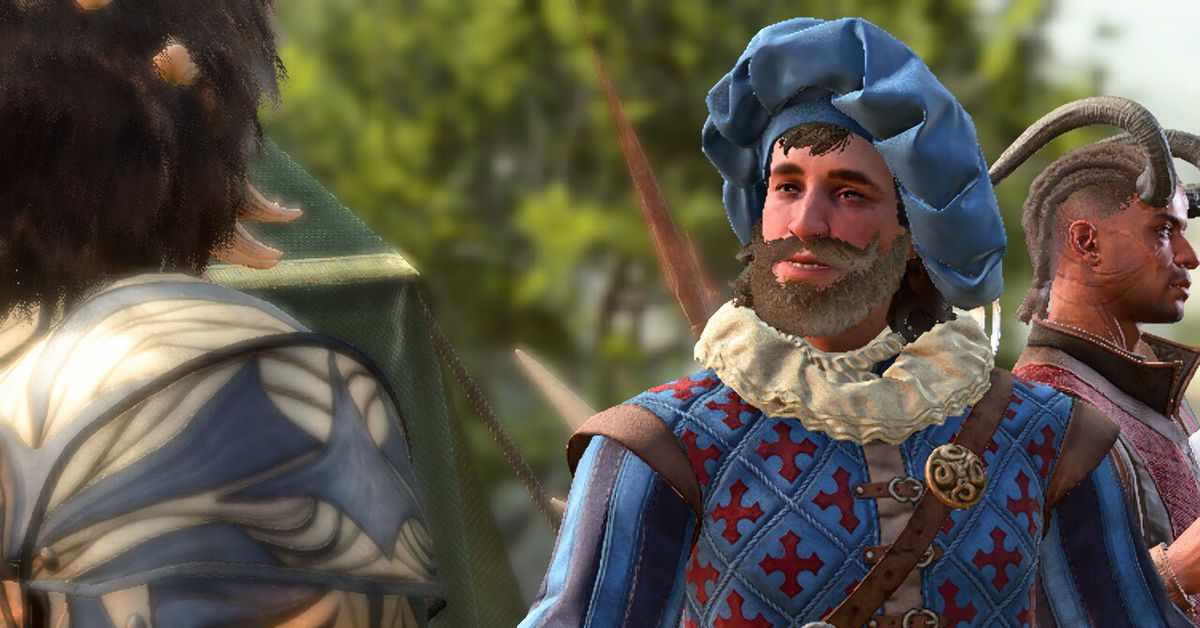/cdn.vox-cdn.com/uploads/chorus_asset/file/24856762/download.jpeg)
Baldur’s Gate 3 has garnered accolades for its flexibility — it feels like you can ally with or betray virtually anyone, including your own party members. I’ve seen it compared to old-school RPGs like Planescape: Torment, “play it your way” immersive sims, and of course, its source material, tabletop Dungeons & Dragons.
After clocking roughly 40 hours in Faerûn, there’s a simultaneously delightful and maddening tension to the open-endedness of Baldur’s Gate 3. On one hand, it pushes me to invest in the high stakes of its narrative, where a single misstep’s personal and universal consequences can feel disastrous. On the other, my most viscerally satisfying encounters have come from abandoning perfectionism and rolling with the punches. I love how badly I can screw things up in this game. But I can’t stand to let the mistakes stick.
I started Baldur’s Gate 3 because of all the weird, silly ways I saw people solving problems; my gateway drug was watching somebody stack 45 crates to sneak over a rampart. (I’m not even talking about the infamous bear-druid romance.) The crates reminded me of my beloved Deus Ex and Thief, where every challenge is a little puzzle box with a complex set of mechanics. The catch is, these games tend to reward methodical, nonviolent mastery. When you can charm, climb, lock-pick, or crate-stack your way through any problem, actually fighting can just feel like a moment of failure.
I love how badly I can screw things up in this game, but I can’t let the mistakes stick
Perfecting the best solution in every encounter, it turned out, was the least fun way to play Baldur’s Gate 3. Thanks to its tabletop roots, there’s a fair bit of luck involved in any gambit; you can buff your stats as high as reasonably possible and still fail skill checks. And unlike many RPGs, Larian Studios rarely feels like it’s punishing you for choosing violence in major plot points. The game has relatively little low-stakes combat grinding, so attacking characters that matter is one of the quickest paths toward earning experience and getting gear. You won’t necessarily tank entire faction allegiances with a single dustup, and if you do, there’s almost always somebody else to turn to. It’s a harsh realm out there. What’s a few fireballs between reluctant allies?
Some of my favorite Baldur’s Gate 3 moments have involved not simply getting into a fight, but getting out in the messiest fashion possible. Sure, I could find the perfect way to dispatch a set of goblin leaders, finding out each one’s weakness and leading them one by one into a trap. Or I could climb into a back room to kill two guards and then just deal with the fact that I’ve accidentally left a witness that turned the whole camp hostile — ending up in a pitched battle that cuts a swath through their entire inner sanctum, with a belated recruitment of my very good platonic friend, the bear.
Baldur’s Gate 3 can feel like a tabletop game, but its stories are preset and finite
At the same time, I can’t bring myself to genuinely embrace unpredictability. It’s true that multiplayer Baldur’s Gate 3 can feel a lot like a real Dungeons & Dragons session. Your choices can have hugely divergent outcomes, including the loss of major characters. But compared with the collaborative improvisation of most tabletop and live-action roleplaying games I’ve joined, it contains a knowable and finite number of stories. And those stories have got their hooks in me. I’ve spent absurd amounts of effort engineering the fates of my favorite characters; I would sooner die than let Karlach and Astarion go unhugged or allow Barcus Wroot to come to harm. It’s partly my perpetual goody-two-shoes impulse to make fictional people happy. But I’m also afraid of cutting off a story before it unfolds, drawn to see the best possible version of Larian’s carefully crafted world.
And paradoxically, I suspect I’m missing out by doing so. Some live-action roleplayers favor a tactic called “playing to lose”: embracing unfavorable outcomes that produce interesting stories. Baldur’s Gate 3 feels similarly built to keep pushing through every loss. Short of your player character outright dying, you can recover from almost anything, albeit with in-world consequences. Its design is so elaborate that even failure points seem to still lead somewhere intriguing, despite how often I instinctively reload.
I’ve dedicated dozens of hours to “winning” Baldur’s Gate 3’s stories: crafting a careful prison break, protecting an inn full of good people, romancing a picky, red-flag-laden vampire elf. Yet I applaud anyone who can accept every botched roll, unexpected companion disapproval, and accidentally murdered gnome — to get the tale that unfolds organically from their character’s mistakes and disasters, however it ends.
Services Marketplace – Listings, Bookings & Reviews
